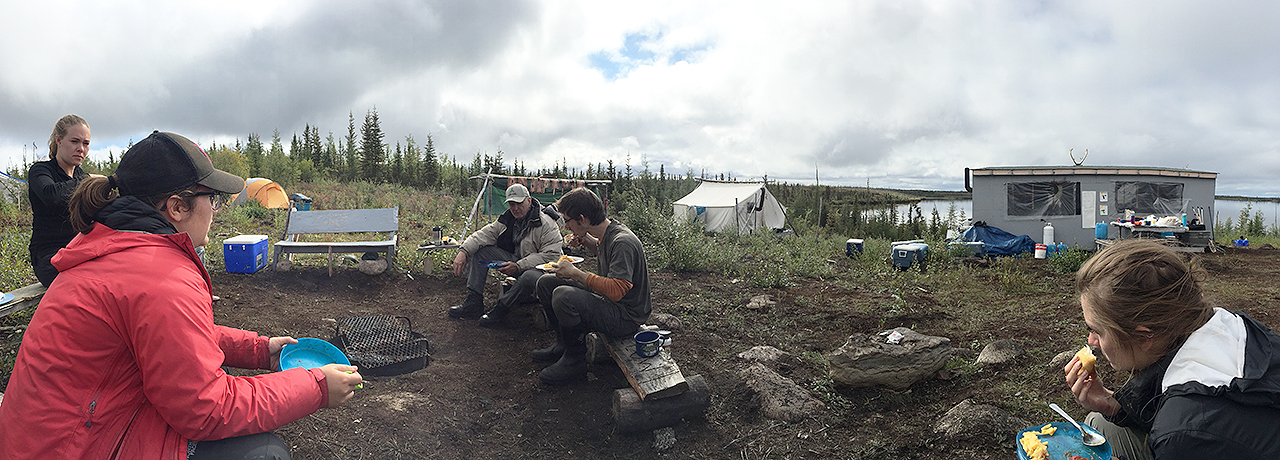
Thousands of kilometres from Laurier's Ontario campuses, university researchers are helping grow youth connections to science and the land in the Northwest Territories.
Laurier this year formalized a partnership with Dehcho First Nations to participate in the Regional Dehcho Youth Ecology Camp, which each year takes youth on the land to connect with Indigenous elders, traditional knowledge holders, scientists and each other.
This year's camp took place from Aug. 27 to Sept. 1 at Willow Lake, Northwest Territories. Twelve youth aged 11 to 16 from across the communities of Dehcho First Nations attended, along with Indigenous elders, traditional knowledge holders, community decision makers, land use planners, Dehcho First Nations staff and five graduate students from Laurier’s Northern Water Futures program.
A Dehcho Guardian, a community member who works to monitor land and water, and a Dehcho Aboriginal Aquatic Resources and Oceans Management (AAROM) staff member also attended the camp.
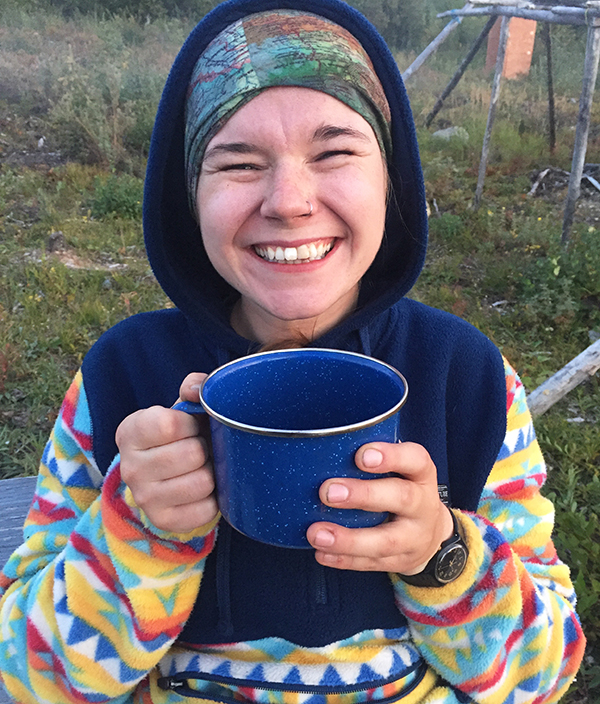
The Dehcho Youth Ecology Camp takes youth on the land to connect with Indigenous elders, scientists and each other.
"The kids are taking away knowledge in science, but also knowledge of cultural teachings and knowledge of language," said Kristen Tanche, regional on the land coordinator with Dehcho First Nations. "These camps provide an important opportunity to reconnect with land."
Willow Lake is a part of the Edéhzhíe, a 14,250-square-kilometre area that in October was declared a federal Indigenous Protected Area, a designation that permanently prohibits development. A mix of boreal forests and wetlands that are home to a vast array of wildlife, the Edéhzhíe holds great cultural, spiritual and ecological significance for the Dehcho First Nations.
While at the camp, Laurier researchers taught youth attendees about scientific techniques to measure changes in water quality, permafrost conditions and ecological function. The youth also learned from traditional knowledge holders, who provided Indigenous perspectives on the land and water.
Campers also learned about language from a language facilitator, about fish and aquatic sciences from Dehcho AAROM staff and about the Dehcho Land Use Plan from Dehcho land use planning staff and traditional knowledge holders.
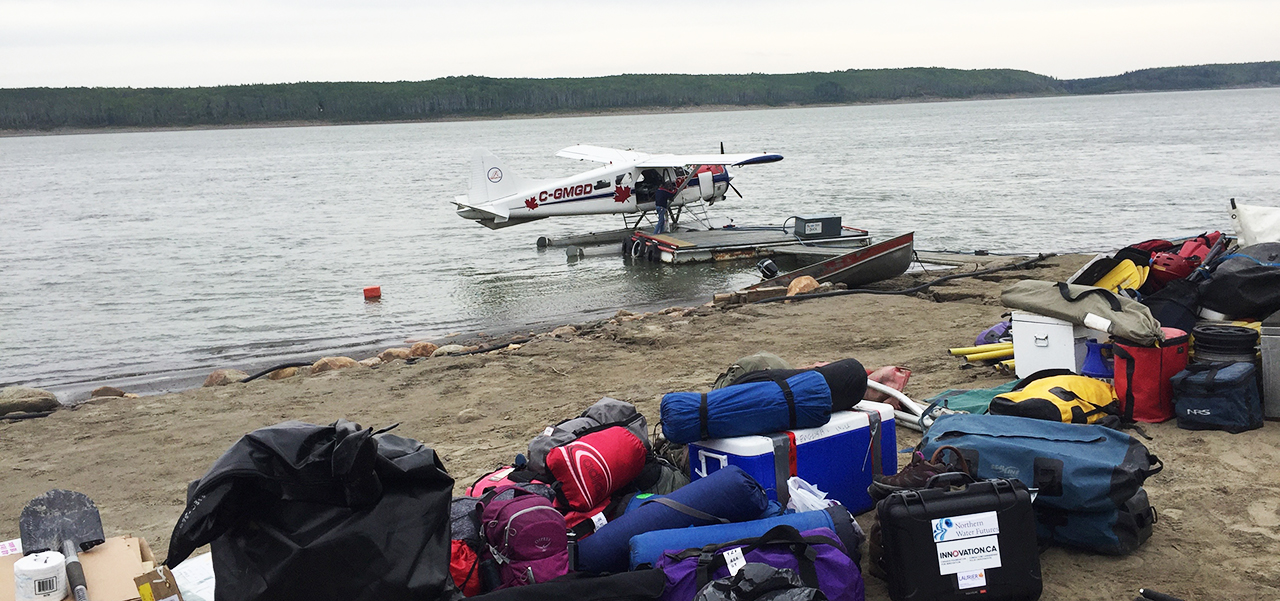 Campers travelled to this year's Dehcho Youth Ecology Camp at Willow Lake, Northwest Territories, by float plane.
Campers travelled to this year's Dehcho Youth Ecology Camp at Willow Lake, Northwest Territories, by float plane.
"Using on-the-land learning, we hope to enable and empower youth to see the land from both scientific and traditional knowledge perspectives and encourage their involvement in research," said Jennifer Baltzer, a professor in Laurier’s Department of Biology and Canada Research Chair in Forests and Global Change.
Baltzer recently secured a $108,000 Natural Sciences and Engineering Research Council PromoScience grant, a portion of which funded Laurier's participation in the camp, also referred to as Northern Research Leadership Camp. As part of its participation, Laurier provided financial resources that helped cover the cost of staff, food and transportation for youth campers. There is no cost to youth attending the camp, which moves to a different location each year.
Other partners in the Dehcho Youth Ecology Camp include Northwest Territories Municipal and Community Affairs, the Dehcho Land Use Planning Committee, Dehcho AAROM, Dehcho First Nations and the Deh Gáh Got’îê Dene Band, whose land this year's camp was held on.
Laurier's involvement in the camp is in large part due to the work of Andrew Spring, a knowledge mobilization specialist for the Global Water Futures project at Laurier whose PhD research involved creating channels of communication with communities in the North to discuss climate change and what might be done to mitigate its impacts. Spring's current position sees him working with Laurier researchers to foster community engagement initiatives.
"During my research, communities talked about the importance of engaging youth and elders on the land, so we tried to create programming that does just that," Spring said. "Instead of us doing the research and reporting back, it can be us doing the research together, building trust and sharing knowledge."
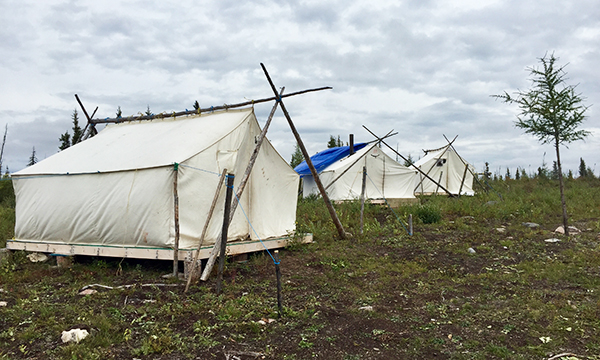
Tents set up at Willow Lake, Northwest Territories, during the Dehcho Youth Ecology Camp.
Tanche said the importance of youth, elders and community members being on the land together has been a focus of Dehcho First Nations for many years, with the communities of Dehcho First Nations creating programming to create such opportunities.
Spring notes that climate change is already dramatically altering landscapes and ways of life in Canada's North. Water levels are decreasing, permafrost is thawing and forest fires are increasing in frequency. These changes – which the elders and people of Dehcho First Nations have noted as occurring for many years – impact fish and wildlife populations that Northern communities rely on.
"Communities want to know what’s happening and to make decisions on how to deal with these changes," Spring says. "It’s about providing knowledge so livelihoods and a way of life can be maintained. This is the stamp we want to put on Laurier's work in the North – that we are working with communities and building relationships so knowledge can be shared."
Tanche also sees the benefits of sharing knowledge, especially when it comes to the Dehcho Youth Ecology Camp.
"Bringing all of these types of knowledge holders – people who may have never been in the area or worked with Indigenous groups – into Dehcho is a really great experience," Tanche says. "It allows us to show them our culture and traditions, to share knowledge with them and for them to share knowledge with us."
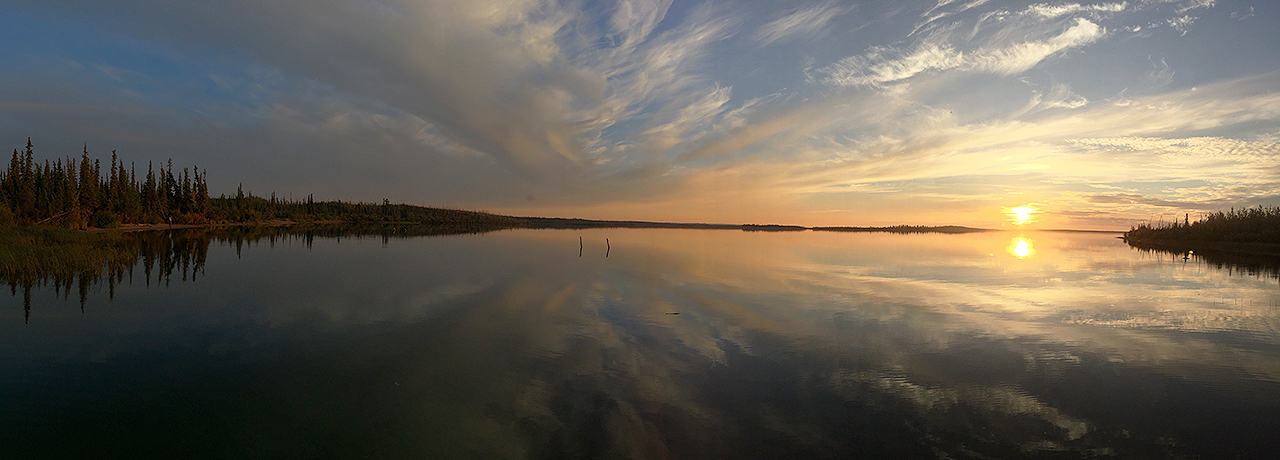 A view of the sun from Willow Lake, Northwest Territories.
A view of the sun from Willow Lake, Northwest Territories.